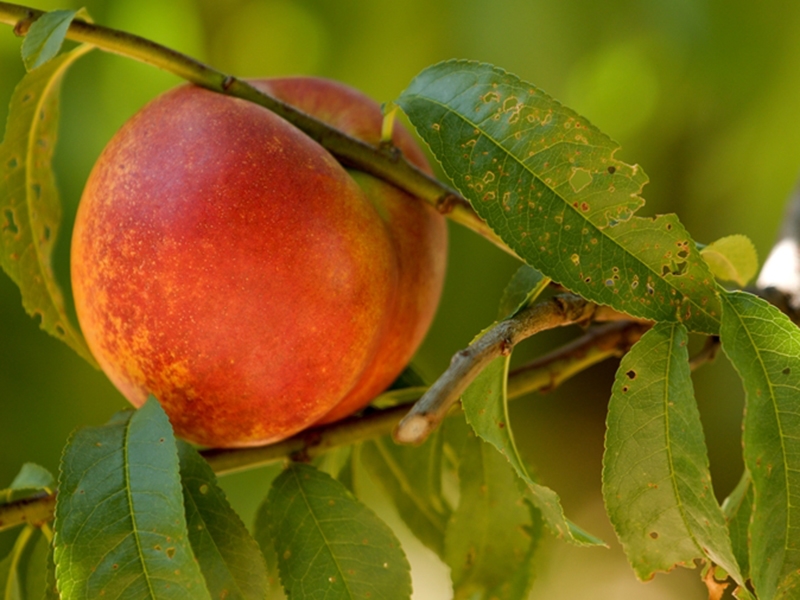
CLARKSVILLE, Ark. – The trademarked Ozark Mango, the seventh nectarine introduced by the Arkansas Fruit Breeding Program, is a yellow-fleshed and standard-acid-level nectarine tailored for growers in the southeast or mid-south of the United States.
Ozark Mango is "the nectarine that I always look forward to picking and the one that I always bring home to my family," said Margaret Worthington, director of the Fruit Breeding Program for the Arkansas Agricultural Experiment Station, the research arm of the U of A System Division of Agriculture.
Ozark Mango is typically harvested around July 1 at the Fruit Research Station in Clarksville, which is similar to Bradley and about one week before Bowden and Amoore Sweet nectarines.
"Over 13 years of trials, Ozark Mango had an average Brix of 15%, indicating that it is very sweet," Worthington said. "It also has a pleasant aroma and flavor that I would describe as 'tropical' or 'mango-like.'"
A ripe Ozark Mango measures about three inches in diameter with about 65% of its surface taking on a blushed color. When sliced open, it reveals a "beautiful yellow-orange flesh that complements its outstanding flavor," Worthington said.
Worthington noted that Ozark Mango is similar to other clingstone, non-melting flesh varieties and exhibits "excellent post-harvest potential," allowing for storage between 14 to 21 days while maintaining its quality. A clingstone and non-melting nectarine means that the fruit's flesh adheres tightly to the pit and maintains its firm texture even when fully ripe, without becoming soft.
"Ozark Mango exhibits remarkable resilience in the face of challenging bacterial spot pressure at the Fruit Research Station," Worthington said. "It shows no cracking on the fruit and displaying tolerance to symptoms on the leaves."
The new variety is estimated to be a mid-chill nectarine appropriate for areas with 600 to 800 chill hours a year, she added.
"Ozark Mango is, in my opinion at least, the tastiest thing we have on this farm," she said. "It's too good not to share."
For further information and licensing on Ozark Mango, growers can contact the Technology Commercialization office by phone at 479-575-3953 or email at agritco@uada.edu.
To learn more about Division of Agriculture research, visit the Arkansas Agricultural Experiment Station website: https://aaes.uada.edu/. Follow us on Twitter at @ArkAgResearch. To learn about extension programs in Arkansas, contact your local Cooperative Extension Service agent or visit www.uaex.uada.edu. Follow us on Twitter and Instagram at @AR_Extension. To learn more about the Division of Agriculture, visit https://uada.edu/. Follow us on Twitter at @AgInArk.
About the Division of Agriculture: The University of Arkansas System Division of Agriculture's mission is to strengthen agriculture, communities, and families by connecting trusted research to the adoption of best practices. Through the Agricultural Experiment Station and the Cooperative Extension Service, the Division of Agriculture conducts research and extension work within the nation's historic land grant education system.The Division of Agriculture is one of 20 entities within the University of Arkansas System. It has offices in all 75 counties in Arkansas and faculty on five system campuses. The University of Arkansas System Division of Agriculture offers all its Extension and Research programs and services without regard to race, color, sex, gender identity, sexual orientation, national origin, religion, age, disability, marital or veteran status, genetic information, or any other legally protected status, and is an Affirmative Action/Equal Opportunity Employer.
Topics
Contacts
John Lovett, project/program specialist
Agricultural Communication Services
479-763-5929,